It is essential that all companies, particularly those in which a large part of their activities have associated risks, adapt their crime prevention models and improve their controls.
The enactment of the Economic Crimes Act incorporated a special regulatory framework to address crimes committed in the corporate environment with a particularly rigorous approach to those who occupy hierarchical positions in the organization. This presents an impact and challenge for companies that are part of the mining industry.
Under this new regulatory framework, economic crimes are classified following objective parameters, proposing to the law four categories under which a crime will be considered as an “Economic Crime”.
The relevance of this catalog of more than 250 crimes is related to the application of an “aggravated” normative framework as regards its sanction. In this context, the main implication for companies is that any crime categorized as an economic crime will be understood within the catalog for which the legal entity may be liable.
In the case of the mining industry, of the four categories defined by the new law, the second one is the one that covers a wide variety of crimes that are applicable to the operation of the mining sector, where the great variety of environmental crimes stand out.
Although our legislation did not lack criminal legislation protecting the environment, it was scattered in several provisions of the Criminal Code and some special laws (Mining Code, Forestry Law, Native Forest Recovery and Forestry Promotion Law, Fishing Law, Hunting Law, National Monuments Law, REP Law, Water Code, Criminal Code and other regulations).
Now, with the new regulations, these offenses are systematically addressed in the following categories:
Pollution offenses under conditions of reinforced administrative illegality.
These offenses, which are related to the ways in which the environment is affected, require some condition of reinforced administrative illegality. Among these are mentioned:
Offenses of circumvention of the Environmental Impact Assessment System and pollution. Such as:
- Discharge of polluting substances into maritime waters.
- Extracting continental waters, whether surface or subway.
- Pouring or depositing polluting substances in the soil or subsoil, continental or maritime, among others.
- Dumping soil or other solids in wetlands.
- Extracting components from the soil or subsoil.
- Release polluting substances into the air.
The penalties associated with all these offenses range from 61 days to 5 years and fines from 120 to 60,000 UTM.
Offenses of repeated contravention of environmental regulations.
With respect to this classification, the same hypotheses mentioned in the previous category apply, together with the fact that the polluting action has been carried out in contravention of an environmental regulation and that the offender has been sanctioned in two different sanctioning procedures and within the 10 years prior to the event.
The penalties for offenses in this category range from 61 days to 3 years and fines from 120 to 60,000 UTM.
There is also the Crime of Illegal Extraction of Water which has associated penalties ranging from 61 days to 3 years and fines from 120 to 60,000 UTM.
Crimes of serious environmental impact.
These are offenses for which the charge is based directly on the seriousness of the impact.
It should be noted that the law considers a series of circumstances to establish the “serious affectation of one or more environmental components”.
Among these are: partial extension, prolonged effects in time, irreparability or difficulty to repair, endangering people’s health, among others.
Offenses introduced to the law that creates the Superintendence of the Environment.
Regarding this category, a hypothesis of malicious presentation of false or incorrect information within the evaluation process within the SEIA or the delivery of false or incomplete information delivered to the Superintendence of the Environment is established.
At the same time, sanctions are established related to the obstruction of inspection activities of the Superintendence of the Environment.
Consequently, conducts that were previously considered administrative infractions will now be typified as crimes, even applicable to companies.
In this sense, it is essential that all companies, particularly those in which a large part of their activities have risks associated with mining issues, adapt their crime prevention models, improve their controls and take all the necessary measures to avoid being exposed to a criminal sanction of this nature.
For more information on these topics please contact:
Antonio Rubilar | Partner | arubilar@az.cl
Alejandro Montt | Mining and Projects Director | amontt@az.cl
Be part of our multimedia platform and receive the latest legal news, events, podcazt and webinars.




